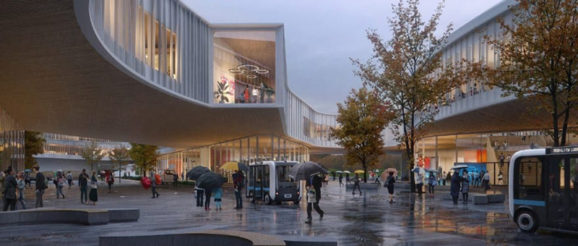Ford’s Campus of the Future in Dearborn Aims to Speed Innovation, Attract Talent


Ford Motor Co. today detailed plans to transform its Research & Engineering Center in Dearborn into a high-tech campus for more than 20,000 designers, engineers, and product development workers by 2025.
The focal point of the automaker’s reimagined complex will be a new central campus building that will sit on the site of Ford’s 66-year-old Product Development Center, located on the northwest corner of today’s Research & Engineering Center.
Sitting along Oakwood Boulevard, close to downtown west Dearborn and The Henry Ford Museum, the central campus building will be finished in 2025 and co-locate more than 6,000 Ford employees – mainly designers and vehicle development teams.
A new building will replace the current Product Development Center. It is scheduled to be completed by the end of 2022.
Ultimately, the master plan envisions a campus of interconnected buildings that could one day house more than 20,000 employees in a flexible, high-tech environment. Combined with the restoration of Michigan Central Station in Detroit’s Corktown neighborhood, Ford says it envisions a collaborative space to create future mobility solutions, speed product and technology innovation, and attract world-class talent.
“Our vision for our Dearborn Research & Engineering campus – and our new Corktown campus and Ann Arbor robotics lab – will enable Ford to lead the next era of transportation and personal mobility, and help us continue our founding mission of driving human progress through the freedom of movement,” says Jim Hackett, president and CEO of Ford.
The new master plan is the result of a two-year research and planning process led by Norwegian firm Snøhetta as lead architect, landscape architect, and master planner. The plan is based on three core principles – integration, interaction and co-location – to advance Ford’s vision to serve customers through a winning portfolio, new propulsion choices, autonomous technology, and mobility services.
“We are building workspaces of the future in Dearborn and globally that will bring all of our people, with their incredible talent and energy, together in one place,” says David Dubensky, chairman and CEO of Ford Land. “Having all employees in state-of-the-art interconnected buildings will facilitate a better flow of ideas and catalyze opportunities for collaboration and knowledge sharing – driving efficient product innovation.”
The new master plan also transforms community engagement as the Research & Engineering Center moves closer to Oakwood Boulevard to be more open and connected to the surrounding neighborhoods. Plans include an increase in public spaces and shared pathways that bring employees and local residents together, as well as coffee shops and restaurants that can serve as meeting places and communal spaces.
The plan envisions an intelligent campus built with flexibility so it can adapt to changes in the industry and work practices. With more freedom to decide where and how they want to work, employees can take advantage of adaptable furniture and flexible workspaces outfitted with the latest productivity tools and technology.
Movement within the campus will be pedestrian-focused and transit-rich, connected directly to amenities and networked through a shared transportation loop, limiting personal vehicle access to the perimeter of the site. The campus will showcase new mobility solutions such as electrified bikes, scooters, and shuttles, evolving over time as autonomous vehicles and other transportation emerges.
The design of the architecture and landscapes promotes natural light, high ceilings, and views of nature, keeping employee health and well-being at the core of the new campus. Amenities will include cafés and restaurants that prioritize sustainable, local products, and farm-to-table food sourcing. There will be connected outdoor environments people can use across all seasons, such as pavilions, courtyards, and covered walkways.
These broad moves in turn intensify the tree density and wetland landscape across the remainder of the site. Where possible, natural environments will be restored to keep the needs of people, vegetation, and wildlife in balance.
“We are creating centers of excellence globally where talent can thrive,” says Dubensky. “These will be inviting places for our employees, partners, businesses and entrepreneurs from around the world to come and work with us to create tomorrow together.”
The post Ford’s Campus of the Future in Dearborn Aims to Speed Innovation, Attract Talent appeared first on DBusiness Magazine.
